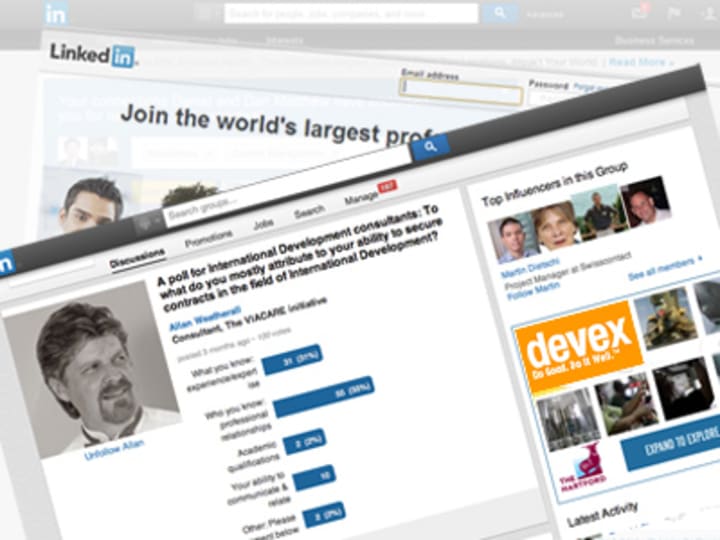
What makes an expert consultant in international development? Perhaps this is a question that crosses the minds of consultants and recruiters from time to time. It’s certainly a question that’s been on my mind as I’ve sought to offer my services as a freelance consultant. What skills are most needed? What areas of personal and professional development do I need to prioritize? What should I emphasise most when I prepare a resume?
I decided to explore the prevailing views of the international development community by posing a question to the 40,000+ members of the Devex Group on LinkedIn: “When hiring a consultant in the field of International Development, what are the most important attributes?”
a) Practical knowledge and field experience?
b) Academic qualifications in development?
c) Cultural familiarity with the country?
d) Professional experience in related field?
e) Affinity with your organization’s values?
The results
The results I received from the survey were both surprising and revealing.
“Practical knowledge and field experience” romped in as the clear winner well ahead of the field with a whopping 66 percent, followed by “professional experience” trailing significantly behind at 22 percent. Next in line was “cultural familiarity” at a mere 5 percent with “affinity for your organizational values” next at 3 percent. And academic qualifications come in a very surprising last at only 2 percent.
The apparent contradiction
Anyone who has scoured the internet looking at job ads may already see something in these results that I quickly noticed: There appears to be an inverse relationship between the attributes that are most valued by international development professionals and those attributes that are most often requested in advertised positions.
If you do a survey of most job ads, academic qualifications usually feature high on the list of specified minimum requirements. Organizations also often seek staff members who share their organization’s particular values — the second-least valued attribute in the survey.
So on one hand, job ads are emphasizing academic qualifications and values-alignment, but seasoned professionals see these as the least important and useful traits of all.
So why this dichotomy?
I’ll try to suggest some possible explanations for this. Perhaps not all readers will agree with me so, by all means, please feel free to contribute your own thoughts.
Possibility 1: Recruiters are simply too busy
Recruiting agents have indicated that they frequently get so many applications for a position that they simply do not have adequate time to examine all of the details of an applicant’s resume. Some say that 30 to 60 seconds per resume is all that they allocate to initially decide whether an applicant is a possible candidate worthy of further consideration.
However not all recruiters screen applicants based on academic credentials. One U.S.-based recruiter admitted to me that when screening candidates, academic credentials barely come into play at all. She suggested that prior experience, proven capability, and other performance indicators were way higher on the list and advised job seekers to prioritize those on their resumes. In fact, she admitted that she often recommends an applicant to her clients even if they don’t meet the minimum academic requirements specified in the position description.
Possibility 2: The education default
Some recruiters looking for shortcuts in the selection process may also be looking for ways to mitigate their responsibility in the selection process. Choosing the most qualified candidate based on their academic achievements, regardless of whether or not they are the most suited to the role, may provide a plausible safeguard against backlash later. If a candidate fails to perform and someone asks the question, “Who made the decision to hire this person?” then there’s always the plausible defense: “Well, he/she certainly looked suitably qualified!”
Possibility 3: Lack of knowledge of what the position really requires
An Australian-based NGO advertised a senior management role for a facility processing asylum seekers in a Pacific Island location. During the interview process, an experienced candidate expressed the view that the highest priority should be the care and emotional wellbeing of detainees, but he left with the impression that the interviewers themselves didn’t have a clear grasp of the real challenges that mission was likely to face. A few months later, he learned that the detainees at that center rioted, with disastrous results to compound infrastructure.
What lessons might we draw from this? It’s impossible to recruit staff for demanding missions abroad without practical knowledge and understanding of the real challenges that are likely to be faced on the ground. In that particular instance, the hiring organization appeared to be looking for someone with senior management skills who knew something about humanitarian aid. What they really needed was an expert in humanitarian aid who knew something about management.
Possibility 4: The culture of academia in international development
Of course all international development initiatives should be informed by adequate research. However, there seems to be a tendency within large organizations to theorize at length and to expend large portions of the budget on endless studies, talk-fests, lengthy meetings, international travel and seminars. And often what’s really most needed is a few phone calls, some consultation and some decisive action.
Academics have a valuable contribution to make to international development, but the biggest myth about higher education is that it reliably certifies an individual’s intelligence and capabilities. The cross-cultural nature of development and the unique demands and challenges that are often encountered in the field require knowledge and skills that are often not acquirable through formal learning.
Possibility 5: Unhealthy corporate culture and political pressure
Assessing an applicant’s suitability for an international mission can be detailed process, and international ventures are often very expensive and sometimes high-risk initiatives. Consequently there are often political implications that come with success or failure — particularly when dealing with large organizations and government-funded initiatives. When multiple “stakeholders” are watching with a critical eye, it can be very easy for those in management to be influenced by the pressures of their expectations, especially if there is a chance of a political backlash.
When staff selection processes become clouded by political considerations, it’s possible that more qualified candidates are passed over in favor of candidates who come with more impressive academic credentials or the right connections.
Possibility 6: Sometimes the most academically qualified applicant is the right choice
Of course it very much depends on the nature of the role and there are some assignments where academically qualified expertise is quite legitimately the highest priority, such as in structural engineering or medical professions. But even in these categories, experience in very demanding field environments can also be critical to mission success.
Possibility 7: The survey results are flawed
While that’s always a possibility, I very much doubt it. To test the results I also hosted the same survey in different forums and got very similar results.
Please leave a comment below, tweet @devexcareers or join the Devex LinkedIn group for recruiters.




